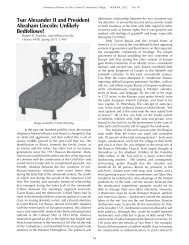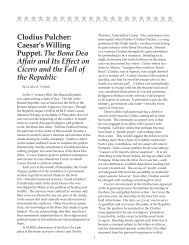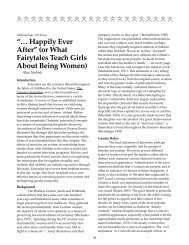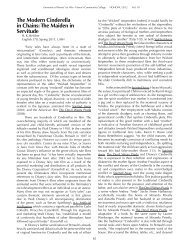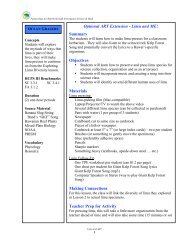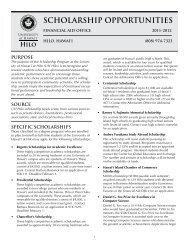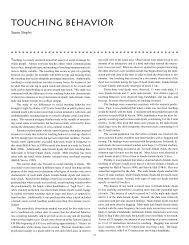A JOURNAL OF ACADEMIC WRITING VOLUME 8
A JOURNAL OF ACADEMIC WRITING VOLUME 8
A JOURNAL OF ACADEMIC WRITING VOLUME 8
Create successful ePaper yourself
Turn your PDF publications into a flip-book with our unique Google optimized e-Paper software.
ignores centuries of overt racism and oppression that led many<br />
black Americans from slavery, and dismisses the overwhelming<br />
statistical evidence that black America continues to live at<br />
a standard far below their white peers. It also dismisses the<br />
viewpoint of many African Americans who feel the weight of<br />
racial disparities on a daily basis, a perspective eloquently stated<br />
in Maud Sutter’s poem, “As A Black Woman”: “As a black<br />
woman, every act is a personal act / Every act is a political act”<br />
(Sutter).<br />
Therefore, at this point in American history, with historical<br />
oppression and institutionalized imbalances left unaddressed,<br />
it is not only disingenuous, but an unconcealed injustice to<br />
remove race from any sector of society, especially one such as<br />
the juvenile justice system—a justice system that holds so much<br />
influence over our future. The current level of discourse which<br />
advocates a “post-racial” view of America leaves a multitude<br />
of inequalities left to fester, which will ultimately manifest<br />
in continued tension along race and class lines. It will also<br />
manifest in the cycle of incarceration, broken families, and<br />
poverty being passed along from generation to generation in the<br />
poorest neighborhoods of America, such as Hunter’s Point.<br />
A more appropriate form of discourse would take into<br />
account both historical and contemporary circumstances. It<br />
must be the voice of individuals who are not clamoring for their<br />
own self-interests, the voice of a society concerned with how<br />
best to move forward in a manner befitting the loftiest ideals<br />
of our nation. Such discourse cannot be afraid to tell the truth<br />
about where we stand as a nation, and where we may stagnate<br />
until the following is acknowledged: that race matters, to our<br />
history, and to our future, not necessarily as a source of conflict,<br />
shame, or pride, but as a crucial and fundamental characteristic<br />
of American life. If race is addressed in an honest and rational<br />
manner, it can be used to cultivate a greater sense of empathy,<br />
ethics, and community in civic life. It is undoubtedly our<br />
responsibility as a society, especially given the specific events<br />
which have led us to this point in history, to create the<br />
conditions which will allow us to arrive at a place of justice, and<br />
peace, for all American citizens.<br />
In the context of the juvenile justice system in San<br />
Francisco, the following actions should be taken preemptively.<br />
Police and probation officers should be made aware of the<br />
continuing disparity in arrest rates amongst juveniles, and<br />
should take steps to ensure that the conditions of poverty<br />
and neighborhood risk are not punished blindly. Youth who<br />
are growing up under higher circumstances of risk must be<br />
provided with resources and opportunities before they become<br />
involved with the juvenile justice system. Juveniles who do<br />
enter the court system should be treated with compassion,<br />
opportunities for rehabilitation, and full freedom over their lives<br />
being an ultimate goal. In neighborhoods of high poverty and<br />
risk, a greater investment in public education and community<br />
development is crucial. Role models and supportive figures<br />
in the lives of these youth must recognize the potential<br />
dangers associated with growing up in conditions of risk,<br />
and must provide added support and structure in a culturally<br />
competent manner. People should not avoid poverty stricken<br />
neighborhoods or merely conceive of them as unsafe areas, but<br />
should contribute time and energy towards improving them.<br />
Finally, advocates for social justice must win back the language<br />
of political discourse, meaning, issues such as race and class<br />
must be openly discussed and acknowledged.<br />
Ultimately this requires a more communal mindset<br />
and a willingness of people to invest in the legacy of the<br />
Civil Rights era, as well a vision for what the future might<br />
hold. In particular, the generation of Americans born<br />
after the Civil Rights era cannot be satisfied to sit idly as<br />
disengaged individuals. Without bold and decisive action, the<br />
institutionalized and internalized levers of oppression take<br />
further hold. Issues of social justice must be owned by the very<br />
people whose lives they impact, and since every citizen has an<br />
investment in their country, it is imperative that every American<br />
continue to push towards a more equitable and just society. To<br />
quote the former President of the Southern Poverty Law Center,<br />
Julian Bond: “Civil rights didn’t begin in Montgomery, and it<br />
didn’t end in the 1960s. It continues on to this very minute.”<br />
And indeed to actively and compassionately address<br />
racial inequality as it exists in the 21 st century, in areas such<br />
as the juvenile justice system in not only San Francisco but<br />
throughout America, is to properly pay homage to the great<br />
honor and struggle of the Civil Rights movement. In embracing<br />
the responsibility of fighting for social justice, we connect the<br />
difficult, but also heroic and beautiful, history of America, with<br />
a vision for a more hopeful and equitable future.<br />
Works Cited<br />
Building Blocks for Youth. Fact Sheet: Punitive Policies Hit Youth<br />
of Color the Hardest. http://www.buildingblocksforyouth.<br />
org/issues/dmc/facts_yoc.html<br />
City and County of San Francisco Juvenile Probation<br />
Department. Monthly Report for September 2009. San<br />
Francisco: Juvenile Probation Department, 2009.<br />
Charish, Courtney, Davis, Sebastian, Damphousse, Kelly.<br />
Race/Ethnicity and Gender Effects on Juvenile Justice<br />
System Processing. Oklahoma Office of Juvenile Affairs,<br />
2004. Mayor’s Office on Community Development. San<br />
Francisco Demographic Profile. http://www.sfgov.org/site/<br />
uploadedfiles/mocd/demoprofile.pdf<br />
McCormack, Erin and Holding, Reynolds. “Too Young to Die.”<br />
HOHONU Volume 8 2010 - 59



